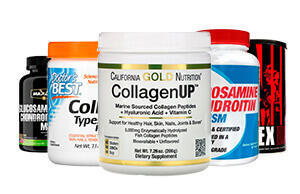Collagen is one of the body’s primary structural proteins, found not only in bones but also making up a significant portion (50–75%) of muscles, tendons, blood vessels, skin, gums, teeth, nails, and eyes. The name itself is telling, as the word “collagen” comes from the Greek words kola (“glue”) and gen (“to generate”). In this sense, collagen acts like an internal adhesive — binding, connecting, and enveloping the body from within, giving elasticity, resilience, strength, and protection to both soft and hard tissues.
There are numerous factors that contribute to collagen depletion and breakdown, including age-related changes, poor nutrition, bad habits (such as alcohol consumption and smoking), external factors (such as UV exposure), and constant physical activity.
To prevent body exhaustion during systematic training, and to support the health, protection, and recovery of tissues, it advisable for athletes and people with active lifestyles to include collagen supplements in their sports nutrition routine.
Collagen is often referred to as the elixir of youth and beauty. And this is not without reason. Regular use of collagen provides tremendous benefits for the body.
Let’s list just a few:
1. Improves the functional condition of the retina and the elasticity of the eye, helping to prevent various diseases (xerophthalmia, glaucoma, cataracts, etc.).
2. Restores the structure and moisture balance of the skin, giving it hydration, softness, and freshness, and reduces signs of aging.
3. Strengthens the hair, enhancing its beauty, shine, thickness, and elasticity; it eliminates brittleness, split ends, and helps prevent hair loss.
4. Slows down the aging process, and reduces the appearance of wrinkles, cellulite, and stretch marks.
5. Regulates sleep and stabilizes emotional well-being.
6. Restores hormonal balance, supports weight loss, and accelerates metabolism.
7. Improves the function of the digestive tract, soothes irritation of the gastrointestinal mucosa, and maintains healthy intestinal peristalsis.
8. Protects the liver from the effects of toxins and alcohol.
9. Improves the condition of joints and tendons, enhances the function of the musculoskeletal system, and strengthens the bones.
Collagen is beneficial for everyone, but for athletes and fitness enthusiasts, it is practically essential. Collagen supplements help speed up recovery after intense workouts, reduce inflammation and pain, and prevent a decline in mobility.
Contraindications for Taking Collagen
As you know, everything is relative. So, despite collagen’s many beneficial properties, it should not be taken carelessly or in combination with other supplements without a doctor’s recommendation.
First, not everyone needs an additional dose of collagen. If a person follows a balanced diet, receives all the necessary vitamins, and has no serious health issues, the body’s natural collagen production is usually sufficient. But how many people are truly that healthy?
Second, collagen supplements can have adverse effects. The main contraindications include pregnancy and breastfeeding, gallstone and kidney stone disease, risk of thrombophlebitis and thrombosis, and allergic reactions to certain components of collagen. If your body is sensitive to common food allergens such as eggs, fish, seafood, dairy, wheat, nuts, or soy, be sure to carefully check the product’s ingredients. If you find any components that may be harmful to you, look for a safer alternative.
How to Use Collagen
Everything is good in moderation. If you follow the manufacturer’s instructions and your doctor’s recommendations, collagen is a safe product on its own. However, exceeding the recommended dosage may lead to unpleasant symptoms such as a bad taste in the mouth, nausea, heartburn, vomiting, abdominal discomfort, diarrhea, itching in the limbs, joint pain, and more.
One more precaution: before taking collagen-containing supplements, it’s important to consider potential interactions with certain medications. To avoid unwanted side effects, it is recommended to read the collagen usage instructions.
1. Timing doesn’t matter. What’s important is to take the supplement on an empty stomach (this could be either one hour before breakfast or two hours after dinner).
2. The daily dosage should be adjusted based on your goals, age, health condition, and lifestyle – within the normal range (from 2.5 to 15 grams).
3. Frequency of intake: For preventive purposes – once a day; to replenish a deficiency – twice a day.
4. Duration of intake: Follow a 3×3 cycle (3 months of use, followed by a 3 month break).
5. Effectiveness can be enhanced by combining collagen with vitamin complexes (e.g., vitamin C, hyaluronic acid, etc.).
We hope this article has helped you better understand collagen and how to use it properly.
However, please remember that this material is for informational purposes only. Before using collagen, it is advisable to consult a physician or take advantage of professional guidance from our specialized store.

